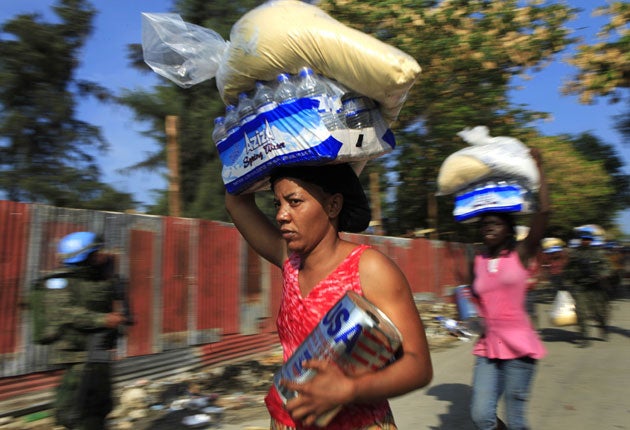Aid must double to respond to natural disasters, UN warned
Haiti calamity has exposed flaws and the need for urgent reform, UK minister tells Kim Sengupta

The global humanitarian network is not "fit for purpose" and will struggle to cope with the Haiti-style natural disasters that will hit some of the world's poorest people as a result of climate change, Britain's International Development minister has warned.
So big are the challenges that the British Government will shortly recommend a doubling of the United Nations' relief funds budget from the current $500m to $1bn (£671m) and a radical overhaul of the system, the minister, Gareth Thomas, told The Independent. He noted that the number of people needing urgent aid is expected to rise from 250 million to more than 375 million in the next five years.
The shortcomings of the international disaster response were shockingly highlighted by the earthquake in Haiti, which killed more than 200,000 people and has left a million homeless. There was extensive criticism of the delays in distributing food, water and medical aid on the ground.
A leaked email from John Holmes, the UN's undersecretary-general for humanitarian services, last month described how poor co-ordination and resourcing had deprived many people on the stricken island of assistance that could have reached them.
Calling on the UN to carry out a thorough review of its procedures, Mr Thomas pointed out that while Britain has pledged $120m to the UN's Central Emergency Relief Fund (Cerf) over the next three years, some other Western countries have failed to pull their weight. Although he did not identify countries, aid groups have complained that France's contribution to Cerf is negligible, and the amounts provided by Germany and the US are small – although the Obama administration has boosted funding since taking office.
Cerf, which was set up after the Asian tsunami, has received increased funding over the years. However, its budget remains minuscule compared, say the aid agencies, to the $23 trillion that European countries contributed to bailing out the banking sector.
Mr Thomas is seeking a "comprehensive stock-take" of the skills of those available to take part in relief efforts, so that emergency responses can be handled without other regions, also in need of assistance, suffering. In Haiti, lead UN agencies were forced to redeploy staff from key crisis response situations elsewhere in the world in order to adequately staff their response to the earthquake.
Mr Thomas said "There is no doubt that the number and severity of natural disasters is increasing and we expect that terrible trend to continue over the next decade. It is therefore vital that we have a humanitarian system that is ready to react. The unpredictable nature of these events is no excuse. We need a system that is fit for purpose, properly funded and has the right people with the right skills in place.
"At the forthcoming humanitarian review ... I also want to see an increase in the speed at which vital resources arrive on the ground in emergency situations."
He added: "We need countries with strong economies to dig deep and ensure the Cerf is fully funded. These countries are often at the forefront of international responses when disaster strikes, but we also need them to dig deep in between times."
Climate change is believed to have been a key factor behind many of the more recent natural calamities. In 2007 there were floods in 23 African and 11 Asian countries, the worst for decades.
The countries affected then and subsequently are some of the poorest in the world. Low-lying parts of Bangladesh and Burma are routinely affected by flooding, while Ethiopia and much of sub-Saharan Africa are repeatedly hit by drought.
According to a recent Oxfam report, there are currently 250 million people across the world who need aid. But the numbers are due to grow by more than 50 per cent to 375 million in the next five years. In January 2009 the UN warned that many of the 235,000 who died due to natural disasters in the previous years could have been saved by more effective aid reaction.
Studies by Oxfam and Save the Children show that natural disasters induced by climate change are often followed by man-made suffering, with violence over scarce resources and the breakdown of law and order leading to deaths, injuries and forced evictions of communities.
In Mozambique, the dramatic floods of 2000 caused $450m of damage and left hundreds of thousands homeless. In 2007 there was more flooding, but, thanks to a "preparedness programme", only 29 lives were lost and there was no need for international assistance.
Haiti earthquake: Rebuilding Port-au-Prince
The huge task of rebuilding the earthquake-shattered capital of Haiti faces its government and donors at a meeting in New York on Wednesday. Haiti's President, René Préval, and foreign partners say rebuilding should be not only to replace the destroyed schools, hospitals and homes, but also to lift Haiti out of the cycle of instability and underdevelopment that has for generations made it one of the poorest countries in the western hemisphere. Even the task of replacing what was already there is daunting: in the capital, some 100,000 homes were destroyed and 200,000 damaged. "Haiti is on its knees. We must get it to stand back up," Mr Préval said in a speech to entrepreneurs. Although the markets and crowds have returned to the streets of the wrecked capital, Port-au-Prince, it is obvious that a huge commitment to the impoverished country will be needed for years to come. Estimates of the damage caused by the 7.0-magnitude quake on 12 January range from £5bn to £9bn. The immediate goal of Wednesday's conference is to secure funds for the next 18 months, and to develop a blueprint for Haiti's future development.
Join our commenting forum
Join thought-provoking conversations, follow other Independent readers and see their replies
Comments